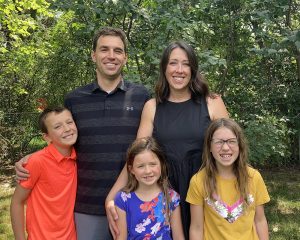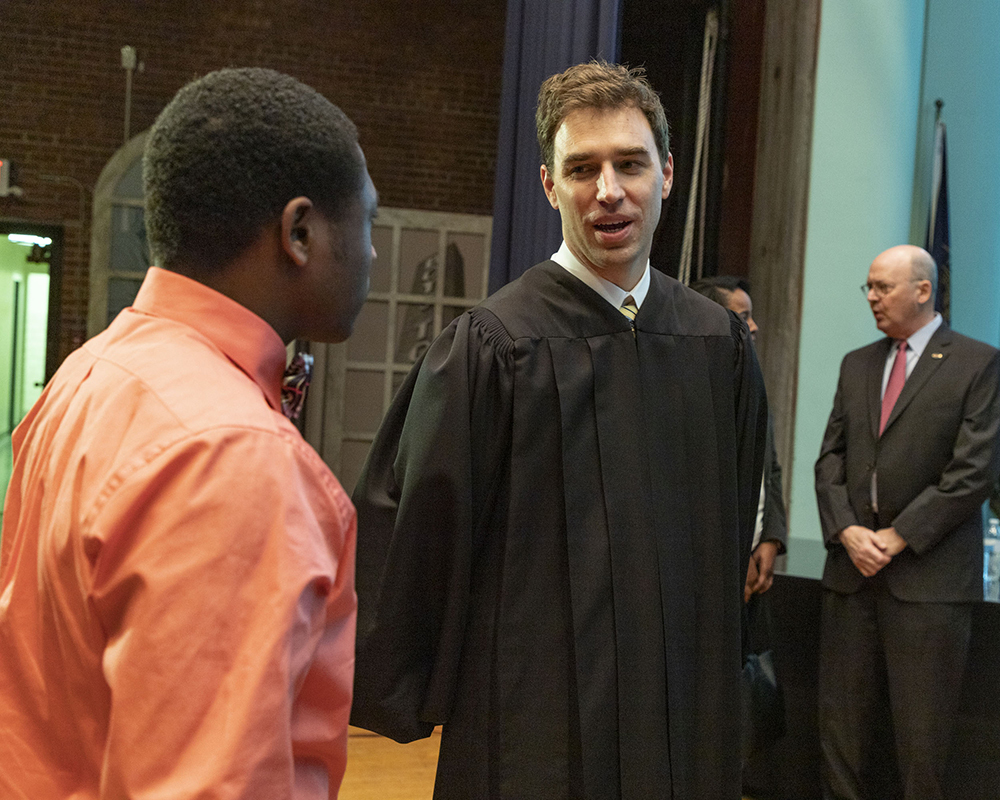When something is deeply important to you, it almost feels like a part of your being.
Everyone wants to be taken seriously, taking the time to really listen to and care for others is a way we can all let a bit of light drip into the world.
We’re all entrusted to care for something or someone, and the character, rectitude, and diligence you put forth in your work and life informs the magnitude of what you’ll be entrusted with. There’s something life-giving and significant about someone with integrity who goes the extra mile in the interplay of work and relationships. You’re more apt to trust them and for good reason: you know that person will be purposeful and take the time to show consideration, regard, and respect.
When it comes to matters of the law—the outcome of your life, liberty, or property at stake—you want someone who actually cares at the helm. Supreme Court Justice Jonathan J. Papik ’04, Fourth Judicial District, is not only the youngest person ever appointed to the state of Nebraska’s highest court, but he is taking his values and intentionality to the bench and making a difference in his field by handling cases with care.
In 2018, Papik, a former lawyer, was sworn in by current U.S. Supreme Court Justice Neil Gorsuch, whom he clerked for when Gorsuch was a judge on the 10th US Circuit Court of Appeals. At Papik’s swearing-in ceremony, Gorsuch said, “We judges are just the caretakers. The law is not ours to make. It is ours to uphold and to apply as fairly and as best we can.” As the Nebraska Supreme Court hears legal arguments about a myriad of topics, Papik has been positioned to foster justice by impartially and evenhandedly applying the law to the cases that come before him.
An Interest Ignited
Looking back on his childhood, Papik reflects that, while growing up, he was curious about government and history. As time went on and he gained more knowledge, that interest gave way to a fascination with the U.S. Supreme Court and the U.S. Constitution.
“I’ve always found it interesting that the framers of our Constitution were able to come up with a document and a plan for government that, with a number of important amendments over the course of the next two centuries, continues to govern us today,” said Papik.
His father, also a lawyer, made the world of law something familiar for Papik. So, coupled with his interests in history and government, it was only natural that Papik went on to be a history major at Northwestern, which he remembers fondly as a season of life he enjoyed.
“I played basketball my first two years at Northwestern, so most of my time was devoted to that and school work,” explained Papik. “I benefited from the well-rounded liberal arts education Northwestern offered. The abilities to think critically and communicate effectively are probably the most important skills in the legal field…. I can think back to not just history classes, but classes in everything from philosophy to English to theology that helped develop those skills.”
During his final years at Northwestern, Papik worked a couple of internships. “One, at the Center of the American Experiment, a public-policy think tank in Minneapolis, was a particularly good experience and helpful to me when I went on to law school,” said Papik. “I had the opportunity to do research and writing on public policy issues.”
Law School at Harvard
After graduating from Northwestern, Papik went on to attend Harvard Law School in Cambridge, Massachusetts. By this time, he had married his wife, Rachel (Hibbard ’03), and even though neither of them had spent much time on the East Coast, they were suddenly living, working, and attending school there and having fun doing it.
“I loved going to Harvard Law School,” Papik remembers. “The school work was challenging but also very interesting. My classmates were from all over the country and came from so many different backgrounds; I learned a lot from many of them. There were also a lot of notable outside speakers that would come to campus: U.S. Supreme Court justices, etc.”
Papik recalls taking a short course during the winter term with Brett Kavanaugh, who wasn’t a U.S. Supreme Court justice at the time, but would later be appointed as one. There wasn’t much time for other activities outside of school at Harvard, but Papik did get back on the basketball court when he could.
“I did play my fair share of pickup and intramural basketball—and a couple pickup games with then Harvard undergrad student and future NBA player Jeremy Lin,” said Papik. “I also worked on a law journal, the Harvard Journal of Law and Public Policy.”
Guides Along the Way
Academics weren’t the only things Papik acquired knowledge about during his time at school. While at Harvard, Papik formed relationships with people who would give him further insight and counsel for the career that was to come. One of these relationships was with John Manning, dean and professor at Harvard Law, who had clerked for the late Justice Scalia.
“Manning was an expert in the areas of law that interested me and did a great job of taking interest in students and providing helpful advice,” explained Papik.
Papik also gained some wonderful mentors after he graduated from Harvard. As his first job after law school, he served as a law clerk for Gorsuch, who at the time was on the U.S. Court of Appeals for the 10th Circuit. Papik also had the opportunity to do another clerkship with Judge Laurence Silberman, a judge on the U.S. Court of Appeals for the D.C. Circuit.
“Both Judge Gorsuch and Judge Silberman were great role models for me when I finished law school. However, the lessons I learned from them are even more valuable to me now that I serve as a judge,” said Papik.
Perhaps most notable is the thing both judges impressed upon Papik: the importance of each case that came before them.
“Although some cases are important to many people, they emphasized that every case is important to those involved in it,” explained Papik. “Although I’m not sure Judge Gorsuch and Judge Silberman phrased it in exactly these terms, they demonstrated a kind of judicial Golden Rule: they treated the case in the manner they would want a judge to treat a case that they themselves were involved in. That required considering every argument carefully and devoting the time necessary to the case to decide it fairly and write a well-reasoned opinion.”
After moving to Omaha, Nebraska, Papik added more great mentors and friends he made at the law firm where he worked. “Law school teaches you a lot about the law, but it doesn’t necessarily teach you a lot about how to be a lawyer. I learned how to be a lawyer from them.”
A Whirlwind of a Process
The pathway to being appointed a state Supreme Court justice often feels fast and furious to those who have been nominated.
The process in Nebraska is rigorous and thorough: applicants must first submit a formal written application that covers a lot of information about their background and what he or she has done as a lawyer. Judges and lawyers must also be asked to serve as references. After the application is submitted, it is given to a judicial nominating commission, which is comprised of four lawyers and four non-lawyers evenly divided between political parties.
A public hearing is then held by the nominating commission at which applications make their case for why they are qualified to serve as a judge. The commission votes to send applicants’ names on to the governor, who then appoints the judge from the approved names.
“The process for filling the vacancy I was appointed to fill went very quickly,” said Papik. “I had just a couple weeks after the vacancy was announced to decide I wanted to apply, prepare the application, solicit references, and get ready to present at the nominating commission hearing, [which was] on a Monday. I got a call the next morning that the governor wanted to interview me that Friday.”
“That gave me only a few days to prepare for that interview,” explained Papik. “The governor then called me the following Tuesday to tell me he was going to appoint me to the Nebraska Supreme Court.”
Papik was sworn into the bench in 2018 and is one of seven judges on the state Supreme Court, the highest court in Nebraska’s judicial branch.
The View from the Bench
Serving as a Supreme Court justice can be both challenging and rewarding. There is much that hangs in the balance of each case, and Papik is intentional about how he approaches who and what comes before his bench.
“The cases that make it to our court usually do so because both sides can make good arguments for their position,” Papik said. “Because of those two things, the outcome matters a great deal to the parties, and the legal answers are often not obvious. On top of that, our opinions set precedents for ourselves and the other courts in the Nebraska judicial system. For all these reasons, I feel obligated to do everything I can to consider the parties’ arguments fairly, apply the law evenhandedly, and write opinions that are easy to understand.”
Papik also strives to create an atmosphere in his chambers that promotes open conversations about the cases.
“I have a legal assistant and two law clerks who work in my chambers,” said Papik. “One of the law clerks has worked for the Nebraska court system for several years, and I hire recent law graduates to one-year jobs for the other spot. I try to create an atmosphere where the law clerks and I have a lot of conversations about the cases. It’s beneficial to my thinking to be able to talk through legal issues with them. They contribute good ideas and often help to clarify my thinking.”
Occasionally, Papik is asked what it’s like to be the youngest person ever appointed to the state of Nebraska’s highest court.
“I’m not sure how to answer because I don’t know what it’s like to do this job at another age! My colleagues do occasionally have to explain movie or music references they make to me.”
Life Outside of the Courtroom
Despite all that goes into his role, Papik makes space and time to be with his family and take part in other activities.
“We have three kids. Bob (left) is 11, Maggie (right) turned nine in August, and Noelle (center) is seven,” said Papik. “Most of the time that I’m not working is spent with Rachel (back right) and them. I have coached Bob’s basketball teams the last several years.”
Papik’s community is important to him as well. “We’re also involved in our church. Up until the pandemic, I was still playing pickup and city league basketball on a regular basis.”
Whether in the courtroom or outside of it, relationships and the people behind them matter, and Papik has made a career of paying attention to that.

For Such a Time as This
Our world needs people who are trustworthy—those who will go above and beyond in the realm of handling weighty issues with care and consideration.
Papik has been positioned in a pivotal role to facilitate and champion justice for the people of Nebraska, and the way he goes about it is purposeful, intentional, and full of regard for the individuals involved in the cases that come before him.
It’s true that chaos and confusion are ripe on this earth, but there is still good pushing back against the turmoil. When you’re invested in people while upholding truth and justice, the combination that results gives way to a powerful fusion: light outshining darkness.

